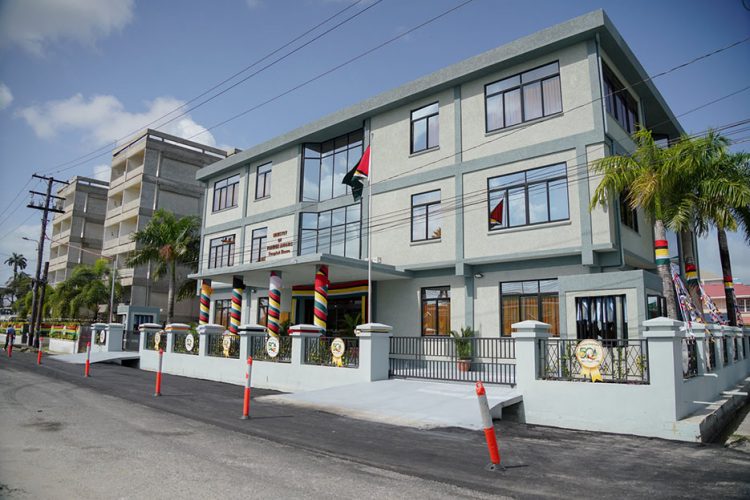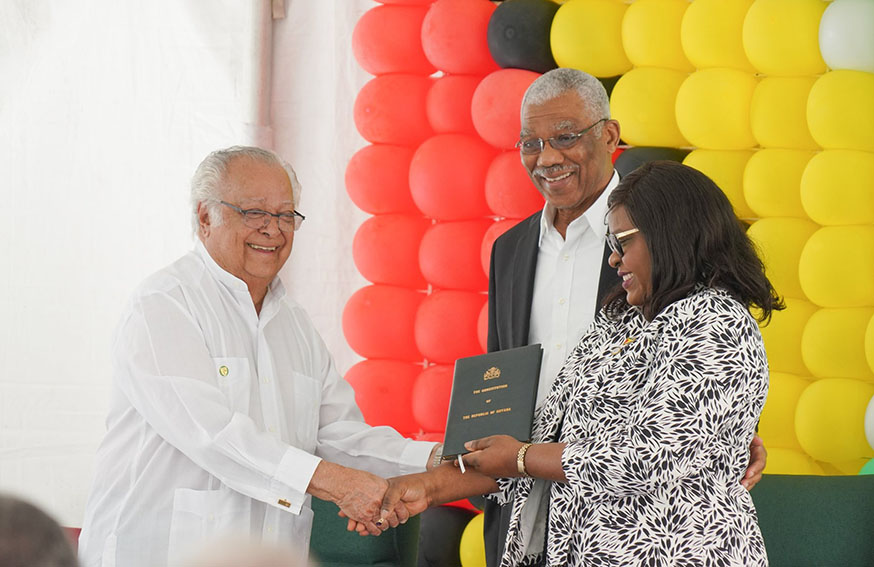With Guyana’s General Elections coming shortly before the International Court of Justice’s (ICJ) hearings on the Venezuela border controversy, this country’s representative at the deliberations, Sir Shridath Ramphal yesterday appealed for national unity as a demonstration to the world.
“The closing days of a national election and the days after it when it pronounces its democratic decision, those days are fractious ones in any democracy, and Guyana is not immune from this. But we do have a greater need than usual to demonstrate to the world that our national motto; One People, One Nation, One Destiny, describes us and does proclaim how elemental that oneness is to our One Destiny,” this country’s first Minister of Foreign Affairs said, as he delivered an address at the recommissioning of Ramphal House – the foreign service office building named for him.

“The proceedings on the 23rd of March in The Hague will be about that destiny. It is my plea to all our fellow Guyanese that between now and then, we do nothing to impair that destiny,” he added.
The ICJ has notified Guyana that hearings will be held in The Hague, the Netherlands from March 23 to 27, 2020.
It will determine whether the Court has jurisdiction over the case lodged by Guyana on March 29, 2018 to obtain from the Court a final and binding judgment that the 1899 Arbitral Award, which established the land boundary between then British Guiana and Venezuela, remains valid and binding.
Guyana brought its case to the Court following the decision by the Secretary-General of the United Nations, António Guterres in January 2018, that the longstanding controversy between Guyana and Venezuela should be decided by the World Court. In taking his decision, the Secretary-General was exercising the power vested in him in the 1966 Geneva Agreement between Guyana, Venezuela and the United Kingdom to decide how the controversy should be settled.
For his part yesterday, President David Granger pointed to Sir Shridath’s contribution to this nation as he underscored the importance of international relations and diplomacy. Quoting former United Nations Secretary General Kofi Annan, Granger said “You can do a lot with diplomacy but, of course, you can do a lot more with diplomacy backed up by firmness and force”.
And while he did not single out Guyana’s case at The Hague, the President seemed to make reference to it saying that this country has always believed in in diplomacy and it is why it turns to the international community for help.
“Guyana has sought the protection of the international community in the face of threats to its territory. It has solicited support and elicited statements of solidarity for its sovereignty and territorial integrity from the Caribbean Community, the Commonwealth and Non-Aligned Movement and from friendly states. Guyana places its trust in international law. Its relations with other states are based on mutual respect for each other’s territorial integrity and sovereignty, mutual non-interference in each other’s internal affairs, cooperation for mutual benefit, respect for treaties and international law, the peaceful settlement of disputes and the maintenance of regional peace and security,” he said.
Granger, who is performing the functions of caretaker President prior to the general elections, told attendees, many of whom included staff from the Foreign Affairs Ministry, that the study of Guyana’s international relations, the understanding of the national interest and the practice of diplomacy should not be left to ignorance or chance.
“A state’s foreign policy represents the guiding principles and objectives in projecting its sovereignty within the global community. The mission of actualizing the state’s foreign policy is entrusted, principally, to its Foreign Service…Diplomats are of vital importance to small states which lack the economic, geographic and strategic power to impose their will on other states in the contentious and confrontational theatre of international relations. Small states must pursue their national interest through diplomacy,” the President said.
“The practice of diplomacy is increasing in scope and complexity. International negotiations now cover a wide spectrum of fields most of which often require specialist and technical expertise. Traversing this treacherous territory cannot be left to the unschooled and uncommitted. Diplomacy requires a corps of educated and dedicated diplomats. A professional Foreign Service, possessing a proficient cadre of career diplomats, is obligatory for the promotion and protection of a state’s national interest,” he added.
He vowed that whatever the undertakings of his government, it will always be guided by the national interest as he also urged diplomats to remember their mandates.
“The state has an obligation to articulate a cogent and coherent foreign policy and to identify the foundational elements of its national interest…diplomats have a duty to protect the country’s citizens, the country and the community, the latter referring to our commitment to regional integration. The protection of citizens, wherever they are, is paramount. The State has an obligation to extend its protection to every citizen. The diaspora’s enormous size, extensive dispersal and enthusiastic nationalism are precious assets. Guyanese resident in the diaspora should be assured that the state, within its means, will respond to their needs for protection and representation”, he said.




